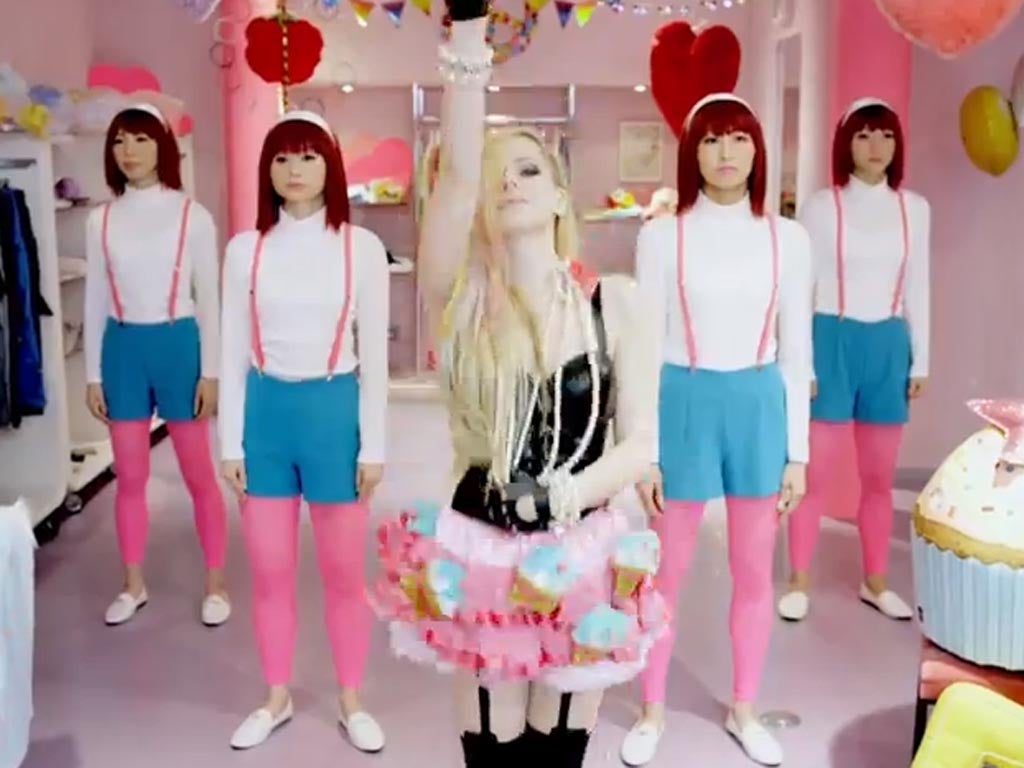Avril Lavigne's ‘Hello Kitty’ and the stereotypes of Japanese women
The singer has shown a complete lack of awareness of how the video fits into a wider view of Japanese culture

Remember when Gwen Stefani went through that disconcerting phase where she had four Japanese backing dancers she pretended she dreamt up follow her around everywhere?
I can't help but wonder, did Canadian singer and perpetual teenager Avril Lavigne remember when she came up with the concept for her new music video, Hello Kitty?
Because there's something vaguely familiar about the video's four props - sorry, backing dancers - who are robotic, expressionless and made up to look completely interchangeable, while she jumps around in the foreground.
There are more serious accusations being made about Hello Kitty than that it resembles a bad Kyary Pamyu Pamyu parody muddled with Skrillex-lite and painful Japanese pronunciation. Nearly nine years after Margaret Cho called Stefani's Harajuku Girls a "minstrel show", Lavigne seems to be inviting similar criticism. While some commentators have suggested that the video's merely problematic - Billboard criticised her "vaguely offensive troop" of dancers - others have been less measured, calling it "creepy/racist" and "an earlyfront runner for the racist music video of the year award" on Twitter.
Avril's made it pretty clear that she doesn't share this view, reacting with "RACIST??? LOLOLOL!!! I love Japanese culture and I spend half of my time in Japan. I flew to Tokyo to shoot this video specifically for my Japanese fans, WITH my Japanese label, Japanese choreographers AND a Japanese director IN Japan."
Nothing makes a language student roll their eyes like the phase "I love X culture". And as a rebuttal - rather than explaining how the video is "an homage to all the things she loves about Japan," as her publicist told ABC News - it's about one step up from "How can I be racist? I have black friends!"
Aside from reverting to basic level racism denial, Avril's response has the added bonus of making her sound about 14 years old. Brushing it aside is about as likely to get her taken seriously as using that should-have-died-in-the-early-noughties outburst OMFG.
But more to the point, it shows a complete lack of awareness of how the video fits into a wider view of Japanese culture. Like Lily Allen's Hard Out Here, which was a whole lot of fun until she put out a video massively objectifying her backing dancers - almost exclusively women of colour - Avril's video doesn't exist in a vacuum.
Using her dancers as props, stripping them of any kind of personality or individuality in contrast to her own, just typecasts Japanese women as homogeneous, submissive and childlike, while Avril seems to be working hard to act out every Japanese stereotype she can.
Fetishising Japanese culture, clapping her hands together like an excitable schoolgirl as she's presented with a plate of sushi - it hardly busts any myths, and the whole thing is hugely infantilising.
Does the fact that it was directed and choreographed by Japanese people make a difference? Perhaps, but I'm not convinced it's enough to make it ok. Orientalist stereotypes are pervasive enough as it is - this certainly doesn't help.
Join our commenting forum
Join thought-provoking conversations, follow other Independent readers and see their replies
Comments